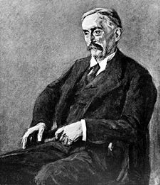
Otto Schott
Encyclopedia
Friedrich Otto Schott was a German chemist
, glass technologist, and the inventor of borosilicate glass
. He was the son of a window glass maker, Simon Schott. From 1870 to 1873 Schott studied chemical technology at the technical college in Aachen
and at the universities of Würzburg
and Leipzig
. He attained a doctorate in glass chemistry at Friedrich Schiller University of Jena
for his thesis “Contributions to the Theory and Practice of Glass Fabrication”.
In 1879, Schott developed a new lithium
-based glass that possessed novel optical
properties. Schott shared this discovery with Dr Ernst Abbe
, which was the catalyst for a long professional relationship between the two.
In 1884, in association with Dr Ernst Abbe and Carl Zeiss
, Otto founded Glastechnische Laboratorium Schott & Genossen (Schott & Associates Glass Technology Laboratory) in Jena. It was here, during the period 1887 through to 1893, that Schott developed borosilicate glass. Borosilicate glass is distinguished for its high tolerance to heat and a substantial resistance to thermal shock (sudden temperature changes) and resistance to degradation when exposed to chemicals.
In 1926 Otto Schott retired from active work at Schott & Associates.
Chemist
A chemist is a scientist trained in the study of chemistry. Chemists study the composition of matter and its properties such as density and acidity. Chemists carefully describe the properties they study in terms of quantities, with detail on the level of molecules and their component atoms...
, glass technologist, and the inventor of borosilicate glass
Borosilicate glass
Borosilicate glass is a type of glass with the main glass-forming constituents silica and boron oxide. Borosilicate glasses are known for having very low coefficients of thermal expansion , making them resistant to thermal shock, more so than any other common glass...
. He was the son of a window glass maker, Simon Schott. From 1870 to 1873 Schott studied chemical technology at the technical college in Aachen
Aachen
Aachen has historically been a spa town in North Rhine-Westphalia, Germany. Aachen was a favoured residence of Charlemagne, and the place of coronation of the Kings of Germany. Geographically, Aachen is the westernmost town of Germany, located along its borders with Belgium and the Netherlands, ...
and at the universities of Würzburg
University of Würzburg
The University of Würzburg is a university in Würzburg, Germany, founded in 1402. The university is a member of the distinguished Coimbra Group.-Name:...
and Leipzig
University of Leipzig
The University of Leipzig , located in Leipzig in the Free State of Saxony, Germany, is one of the oldest universities in the world and the second-oldest university in Germany...
. He attained a doctorate in glass chemistry at Friedrich Schiller University of Jena
Friedrich Schiller University of Jena
Friedrich Schiller University of Jena , is a public research university located in Jena, Thuringia, Germany....
for his thesis “Contributions to the Theory and Practice of Glass Fabrication”.
In 1879, Schott developed a new lithium
Lithium
Lithium is a soft, silver-white metal that belongs to the alkali metal group of chemical elements. It is represented by the symbol Li, and it has the atomic number 3. Under standard conditions it is the lightest metal and the least dense solid element. Like all alkali metals, lithium is highly...
-based glass that possessed novel optical
Optics
Optics is the branch of physics which involves the behavior and properties of light, including its interactions with matter and the construction of instruments that use or detect it. Optics usually describes the behavior of visible, ultraviolet, and infrared light...
properties. Schott shared this discovery with Dr Ernst Abbe
Ernst Karl Abbe
- See also :*Abbe prism*Abbe refractometer*Abbe error*Aberration in optical systems*Calculation of glass properties* German inventors and discoverers-External links:*...
, which was the catalyst for a long professional relationship between the two.
In 1884, in association with Dr Ernst Abbe and Carl Zeiss
Carl Zeiss
Carl Zeiss was a German maker of optical instruments commonly known for the company he founded, Carl Zeiss Jena . Zeiss made contributions to lens manufacturing that have aided the modern production of lenses...
, Otto founded Glastechnische Laboratorium Schott & Genossen (Schott & Associates Glass Technology Laboratory) in Jena. It was here, during the period 1887 through to 1893, that Schott developed borosilicate glass. Borosilicate glass is distinguished for its high tolerance to heat and a substantial resistance to thermal shock (sudden temperature changes) and resistance to degradation when exposed to chemicals.
In 1926 Otto Schott retired from active work at Schott & Associates.

